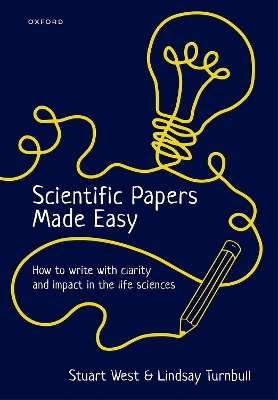
Scientific Papers Made Easy
How to Write with Clarity and Impact in the Life Sciences
Seiten
2023
Oxford University Press (Verlag)
978-0-19-286279-2 (ISBN)
Oxford University Press (Verlag)
978-0-19-286279-2 (ISBN)
This contemporary guide is packed full of expert tips and suggestions which will provide the reader with the means and motivation to write better scientific papers that are more likely to be read and have impact.
Writing scientific publications is a fundamental step in the research process. Furthermore, as science becomes more interdisciplinary and the number of journals continues to expand, individual papers increasingly need to stand out to be read and have any form of impact. It is widely assumed that students and early career scientists will simply acquire the necessary expertise. However, this could not be further from the truth - many early career scientists find writing both intimidating and overwhelming; writing is a skill that needs to be learnt and actively developed.
This novel book's fundamental principle is simple - the reader must come first. The purpose of a scientific paper is to pass on knowledge, and so impactful writing must focus on attracting, holding, and illuminating readers. The authors demonstrate how just a few simple pointers can significantly improve both writing quality and impact. They tackle each component of a paper in turn, providing a simple framework that makes clear what needs to be included (and what doesn't!), and in what order. They also provide advice for writing up different types of science, from laboratory experiments to theoretical modelling. The focus throughout is on the need to use simple, jargon-free English, and to assume that the reader has little or no prior knowledge. In summary, the book is about writing better scientific papers that are more likely to be read and have impact.
Scientific Papers Made Easy is targeted at a broad audience of students and professionals, across the biological, life, and human sciences. It uses simple biological and human examples that assume no prior knowledge and will resonate with any scientist.
Writing scientific publications is a fundamental step in the research process. Furthermore, as science becomes more interdisciplinary and the number of journals continues to expand, individual papers increasingly need to stand out to be read and have any form of impact. It is widely assumed that students and early career scientists will simply acquire the necessary expertise. However, this could not be further from the truth - many early career scientists find writing both intimidating and overwhelming; writing is a skill that needs to be learnt and actively developed.
This novel book's fundamental principle is simple - the reader must come first. The purpose of a scientific paper is to pass on knowledge, and so impactful writing must focus on attracting, holding, and illuminating readers. The authors demonstrate how just a few simple pointers can significantly improve both writing quality and impact. They tackle each component of a paper in turn, providing a simple framework that makes clear what needs to be included (and what doesn't!), and in what order. They also provide advice for writing up different types of science, from laboratory experiments to theoretical modelling. The focus throughout is on the need to use simple, jargon-free English, and to assume that the reader has little or no prior knowledge. In summary, the book is about writing better scientific papers that are more likely to be read and have impact.
Scientific Papers Made Easy is targeted at a broad audience of students and professionals, across the biological, life, and human sciences. It uses simple biological and human examples that assume no prior knowledge and will resonate with any scientist.
Stuart West was the recipient of the Zoological Society of London Scientific Medal (June 2007), the Phillip Leverhulme Prize (October 2006), and the Chancellor's Rising Star Award, Edinburgh University (August 2006). Lindsay Turnbull was the recipient of the University of Oxford Excellence in Teaching Award in 2019.
1: Writing as an Essential Research Skill
2: Core Skills
3: Methods
4: Results
5: Figures
6: Introductions
7: Discussions
8: Abstracts
9: Titles
10: Cover Letters
11: Writing and Editing
| Erscheinungsdatum | 12.05.2023 |
|---|---|
| Zusatzinfo | 75 figures and cartoons |
| Verlagsort | Oxford |
| Sprache | englisch |
| Maße | 170 x 245 mm |
| Gewicht | 412 g |
| Themenwelt | Schulbuch / Wörterbuch ► Wörterbuch / Fremdsprachen |
| Geisteswissenschaften ► Sprach- / Literaturwissenschaft ► Literaturwissenschaft | |
| Geisteswissenschaften ► Sprach- / Literaturwissenschaft ► Sprachwissenschaft | |
| Naturwissenschaften ► Biologie | |
| ISBN-10 | 0-19-286279-0 / 0192862790 |
| ISBN-13 | 978-0-19-286279-2 / 9780192862792 |
| Zustand | Neuware |
| Informationen gemäß Produktsicherheitsverordnung (GPSR) | |
| Haben Sie eine Frage zum Produkt? |
Mehr entdecken
aus dem Bereich
aus dem Bereich
Buch | Softcover (2020)
Beuth (Verlag)
19,90 €
Begriffe - Verfahren - Arbeitstechniken
Buch | Softcover (2024)
De Gruyter (Verlag)
24,95 €


